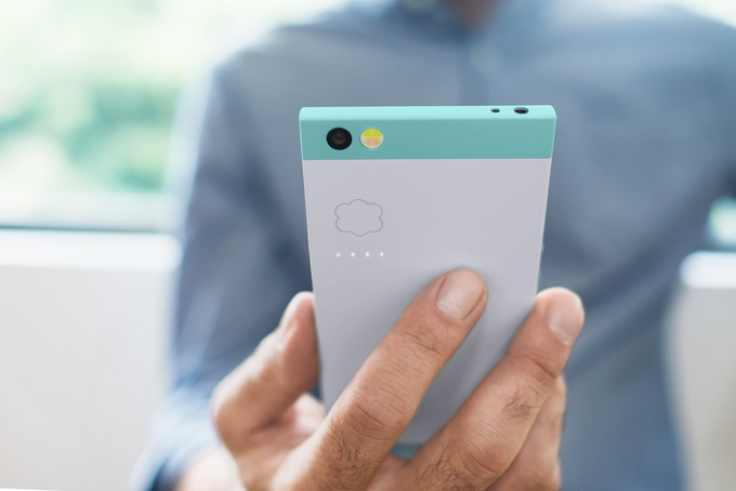Nextbit Robin Smartphone Preorders Begin; Secretive Startup Touts ‘Built-In’ Cloud, 100GB Free Storage

LONDON -- Backed by Google Ventures and founded by entrepreneurs central to the early development of Android, San Francisco-based smartphone startup Nextbit has launched the Robin smartphone which promises to leverage the power of the cloud and get smarter over time.
Robin is the first smartphone from a company which has been attracting a lot of attention in Silicon Valley. It was co-founded by Tom Moss and Mike Chan, both of whom were critical to the early success of Android. The company also has signed up hardware specialist Scott Croyle, who was responsible for the design of the multi-award winning HTC One series of smartphones.
The Robin smartphone is available to pre-order now through Kickstarter, and will cost $299 for the first 1,000 backers, while everyone else will still get the phone at the discounted price of $349. When the phone goes on general sale in the first quarter of 2016, it will retail for $399.
The key selling point for the Robin over the myriad of other Android smartphones on the market is cloud storage – lots of it. Nextbit is offering every customer 100GB of cloud storage to complement the 32GB of space on the phone. The phone will automatically store certain items in the cloud as and when it deems necessary.
“Robin has the cloud integrated right into Android OS, seamlessly expanding your storage online so you always have the space you need for what you want most. By tapping the unlimited potential of the cloud, Robin delivers far beyond its specs. Robin intelligently adapts to your storage needs, and automatically optimises the space on your phone when it sees you need it. By learning the apps you use and the space you need, Robin offloads the stuff you don’t use to the cloud,” the company said in a statement.
Nextbit CEO Moss said ahead of the launch that the enhancements the company has made to Android will allow the phone to improve with age and get smarter over time.
Apps, photos and videos which have been backed up to the cloud are available at all times and tapping on the specific item will restore it locally. The Nextbit software is built on top of Android rather than being a fork of it, meaning the company is going down the route of fellow Silicon Valley startup Cyanogen rather than the option taken by Amazon with its Fire tablets and smartphone.
Indeed Moss is a founding board member of Cyanogen and has described what Nextbit is doing with its smartphone as “supercharging” Android rather than replacing it.
In terms of the hardware, the Robin is a world away from Croyle’s sleek and shiny HTC One smartphones, featuring instead a squared, plastic finish which comes in turquoise and black (or Mint and Midnight according to the company’s marketing speak). In terms of specs, the Robin will feature a Snapdragon 808 processor from Qualcomm paired with 3GB of RAM, will have a 5.2-inch Full HD display (1920x1080 pixels) and feature a relatively modest 13 megapixel sensor on the rear camera (though more megapixels doesn’t necessarily mean better images).
The Robin also features a fingerprint sensor built into the home button, as well as NFC, a USB-C connector and quick charge technology to boost the relatively meagre 2650mAh battery.
A Crowded Field
Despite the pedigree of the founding partners, the design chops of Croyle and the backing of both Google Ventures and Accel Partners, the Robin is going to be a tough sell.
There is little doubt that the company will easily hit its 30-day Kickstarter target of $500,000 -- probably within the first hour -- but that is no guarantee of success. The Ubuntu Edge smartphone raised over $12 million in a single month, yet it is unlikely to ever get a release.
The smartphone market is notoriously difficult to make any money in with Apple the only company pulling in sizeable profits. The most recent estimate from Canaccord suggests that Apple makes 92% of all smartphone industry profits.
Nextbit is launching its smartphone in what it calls the “premium tier” of the market. The $400 price tag means it won’t be competing with the likes of the iPhone 6 or Galaxy S6 but it could be argued that the sector it is entering is even more crowded and cutthroat, with a host of competitors including OnePlus, Huawei, Xiaomi and Obi. This is an interesting time for smartphone startups in the Valley, as alongside Nextbit and Cyanogen, we have just seen the launch of the Obi smartphone brand backed by former Apple CEO John Sculley, a smartphone which will sell from just $129, again indicating just how competitive the market is these days.
At this price, margins are incredibly tight and while the Shenzhen, China-based smartphone manufacturing infrastructure makes it easier than ever for companies to scale-up their production volumes without huge cost, Nextbit is just the latest in a long line of companies which are trying to do exactly the same.
While Nextbit may be fairly unique in the U.S., in Asia there are dozens of companies offering cutting-edge hardware at a budget price. Startups like OnePlus and Xiaomi are making a significant impact on the market while more established players like Huawei and ZTE are able to use their existing manufacturing network to get similar devices to market fast and at lower prices.
The Nextbit Robin offers an intriguing look at where smartphones may be going in the future -- the cloud -- but it is hard to see how this alone will convince users to choose this phone over the likes of the OnePlus 2 or Moto X Play.
© Copyright IBTimes 2024. All rights reserved.












